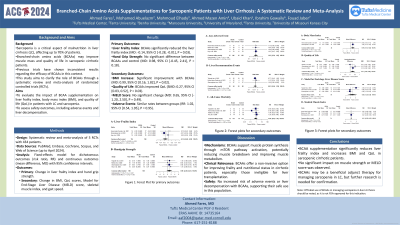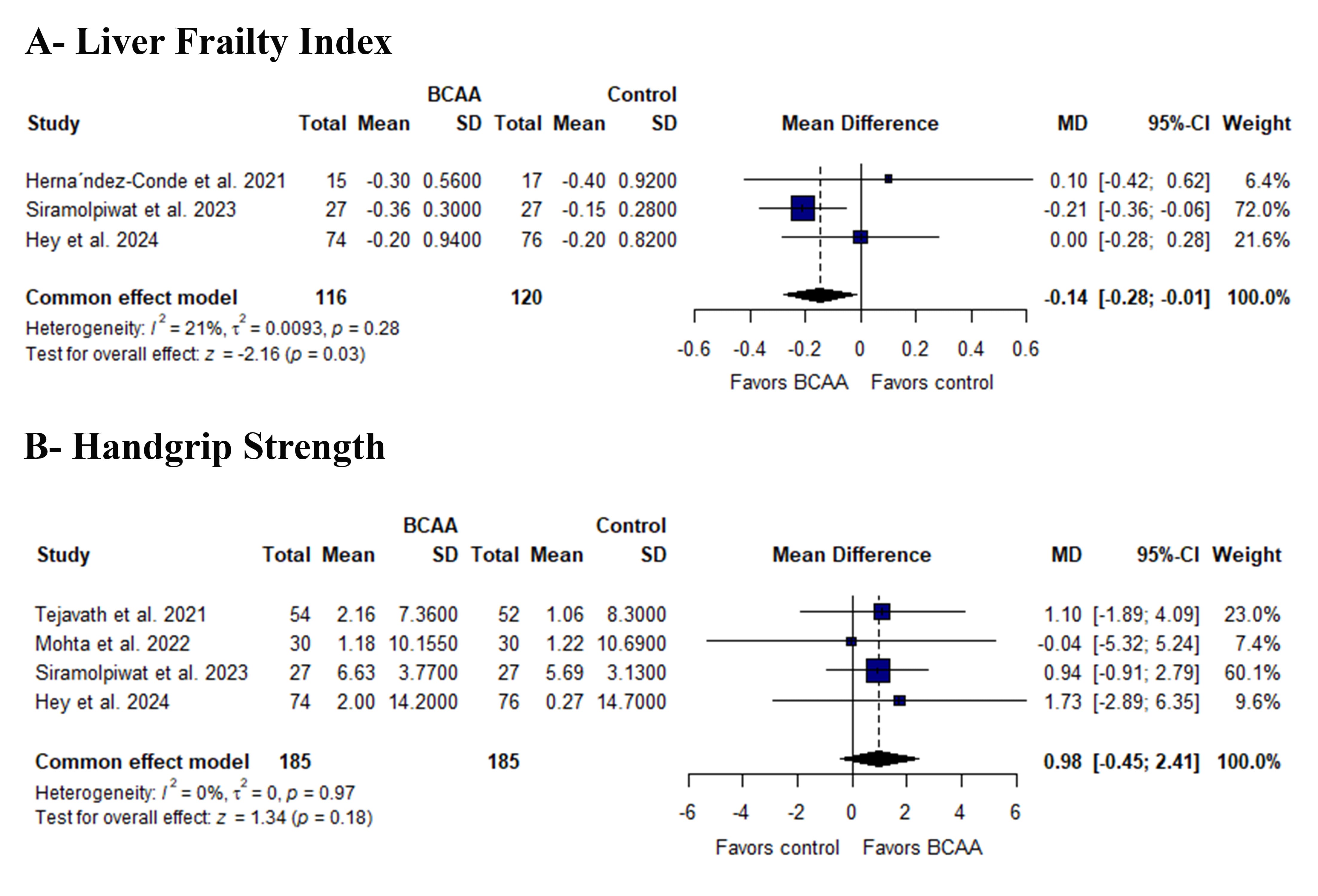Tuesday Poster Session
Category: Liver
P4648 - Branched-Chain Amino Acids Supplementations for Sarcopenic Patients with Liver Cirrhosis: A Systematic Review and Meta-Analysis
Tuesday, October 29, 2024
10:30 AM - 4:00 PM ET
Location: Exhibit Hall E

Has Audio

Ahmed Fares, MD
Tufts Medical Center
Boston, MA
Presenting Author(s)
Ahmed Fares, MD1, Mohamed Abuelazm, MD2, Mahmoud M.. Elhady, MBBCh3, Ahmed Mazen Amin, MBBCh4, Ubaid Khan, MD5, Ibrahim Gowaily, MBBCh2, Fouad Jaber, MD, MS6
1Tufts Medical Center, Boston, MA; 2Tanta University, Tanta, Al Gharbiyah, Egypt; 3Benha University, Benha, Al Qalyubiyah, Egypt; 4Mansoura University, Mansoura, Ad Daqahliyah, Egypt; 5University of Maryland, Baltimore, MD; 6University of Missouri - Kansas City School of Medicine, Kansas City, MO
Introduction: Sarcopenia, characterized by reduced muscle mass and function, is prevalent in 30–70% of Liver Cirrhosis (LC) patients and predicts poor survival. Branched-chain amino acids (BCAAs) supplementation has shown potential in managing sarcopenia by improving nutritional status and liver function. However, results across studies are inconsistent. This systematic review and meta-analysis evaluates the efficacy and safety of BCAAs in sarcopenia management in LC patients.
Methods: A systematic review and meta-analysis synthesizing evidence from randomized control trials (RCTs) obtained from PubMed, Embase, Cochrane, Scopus, and Web of Science from inception to April 2024. We used the fixed-effects model to report dichotomous outcomes using risk ratio (RR) and continuous outcomes using mean difference (MD), with a 95% confidence interval (CI). PROSPERO ID: CRD42024542761.
Results: Five RCTs with 434 patients were included. BCAAs were significantly associated with decreased liver frailty index change (MD: -0.14 with 95% CI [-0.28, -0.01], P= 0.03; figure 1A). However, there was no significant difference between BCAAs and the control group regarding hand grip strength change (MD: 0.98 with 95% CI [-0.45, 2.41], P= 0.18; figure 1B). Also, BCAAs were significantly associated with increased BMI change (MD: 0.99 with 95% CI [0.16, 1.82], P= 0.02; table 1) and increased QoL (SMD: 0.27 with 95% CI [0.03, 0.52], P= 0.03; table 1). However, there was no significant difference between BCAAs and the control group in MELD score change (MD: 0.65 with 95% CI [-1.20, 2.50], P= 0.49; table 1), skeletal muscle index change (MD: 0.21 with 95% CI [-0.23, 0.65], P= 0.35; table 1), and gait speed change (MD: 0.10 with 95% CI [-0.15, 0.34], P= 0.43; table 1).
Discussion: BCAA supplementation significantly reduced the liver frailty index, indicating a potential benefit in managing frailty. The absence of significant improvement in muscle strength, measured by hand-grip strength, may be due to the complexity of LC patients and the complexity of protein synthesis, which involves pathways beyond those influenced by BCAAs. The increase in BMI and QoL can be attributed to BCAAs' role in ammonia detoxification and improving overall metabolic function. Despite these benefits, the lack of significant changes in MELD score, skeletal muscle index, gait speed, or albumin levels suggests that while BCAAs might have some benefit in LC with sarcopenia, their overall impact on muscle mass in LC requires further investigation.

Note: The table for this abstract can be viewed in the ePoster Gallery section of the ACG 2024 ePoster Site or in The American Journal of Gastroenterology's abstract supplement issue, both of which will be available starting October 27, 2024.
Disclosures:
Ahmed Fares, MD1, Mohamed Abuelazm, MD2, Mahmoud M.. Elhady, MBBCh3, Ahmed Mazen Amin, MBBCh4, Ubaid Khan, MD5, Ibrahim Gowaily, MBBCh2, Fouad Jaber, MD, MS6. P4648 - Branched-Chain Amino Acids Supplementations for Sarcopenic Patients with Liver Cirrhosis: A Systematic Review and Meta-Analysis, ACG 2024 Annual Scientific Meeting Abstracts. Philadelphia, PA: American College of Gastroenterology.
1Tufts Medical Center, Boston, MA; 2Tanta University, Tanta, Al Gharbiyah, Egypt; 3Benha University, Benha, Al Qalyubiyah, Egypt; 4Mansoura University, Mansoura, Ad Daqahliyah, Egypt; 5University of Maryland, Baltimore, MD; 6University of Missouri - Kansas City School of Medicine, Kansas City, MO
Introduction: Sarcopenia, characterized by reduced muscle mass and function, is prevalent in 30–70% of Liver Cirrhosis (LC) patients and predicts poor survival. Branched-chain amino acids (BCAAs) supplementation has shown potential in managing sarcopenia by improving nutritional status and liver function. However, results across studies are inconsistent. This systematic review and meta-analysis evaluates the efficacy and safety of BCAAs in sarcopenia management in LC patients.
Methods: A systematic review and meta-analysis synthesizing evidence from randomized control trials (RCTs) obtained from PubMed, Embase, Cochrane, Scopus, and Web of Science from inception to April 2024. We used the fixed-effects model to report dichotomous outcomes using risk ratio (RR) and continuous outcomes using mean difference (MD), with a 95% confidence interval (CI). PROSPERO ID: CRD42024542761.
Results: Five RCTs with 434 patients were included. BCAAs were significantly associated with decreased liver frailty index change (MD: -0.14 with 95% CI [-0.28, -0.01], P= 0.03; figure 1A). However, there was no significant difference between BCAAs and the control group regarding hand grip strength change (MD: 0.98 with 95% CI [-0.45, 2.41], P= 0.18; figure 1B). Also, BCAAs were significantly associated with increased BMI change (MD: 0.99 with 95% CI [0.16, 1.82], P= 0.02; table 1) and increased QoL (SMD: 0.27 with 95% CI [0.03, 0.52], P= 0.03; table 1). However, there was no significant difference between BCAAs and the control group in MELD score change (MD: 0.65 with 95% CI [-1.20, 2.50], P= 0.49; table 1), skeletal muscle index change (MD: 0.21 with 95% CI [-0.23, 0.65], P= 0.35; table 1), and gait speed change (MD: 0.10 with 95% CI [-0.15, 0.34], P= 0.43; table 1).
Discussion: BCAA supplementation significantly reduced the liver frailty index, indicating a potential benefit in managing frailty. The absence of significant improvement in muscle strength, measured by hand-grip strength, may be due to the complexity of LC patients and the complexity of protein synthesis, which involves pathways beyond those influenced by BCAAs. The increase in BMI and QoL can be attributed to BCAAs' role in ammonia detoxification and improving overall metabolic function. Despite these benefits, the lack of significant changes in MELD score, skeletal muscle index, gait speed, or albumin levels suggests that while BCAAs might have some benefit in LC with sarcopenia, their overall impact on muscle mass in LC requires further investigation.

Figure: Figure 1 Forest Plots for Primary Outcomes
Note: The table for this abstract can be viewed in the ePoster Gallery section of the ACG 2024 ePoster Site or in The American Journal of Gastroenterology's abstract supplement issue, both of which will be available starting October 27, 2024.
Disclosures:
Ahmed Fares indicated no relevant financial relationships.
Mohamed Abuelazm indicated no relevant financial relationships.
Mahmoud Elhady indicated no relevant financial relationships.
Ahmed Mazen Amin indicated no relevant financial relationships.
Ubaid Khan indicated no relevant financial relationships.
Ibrahim Gowaily indicated no relevant financial relationships.
Fouad Jaber indicated no relevant financial relationships.
Ahmed Fares, MD1, Mohamed Abuelazm, MD2, Mahmoud M.. Elhady, MBBCh3, Ahmed Mazen Amin, MBBCh4, Ubaid Khan, MD5, Ibrahim Gowaily, MBBCh2, Fouad Jaber, MD, MS6. P4648 - Branched-Chain Amino Acids Supplementations for Sarcopenic Patients with Liver Cirrhosis: A Systematic Review and Meta-Analysis, ACG 2024 Annual Scientific Meeting Abstracts. Philadelphia, PA: American College of Gastroenterology.
